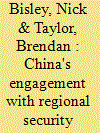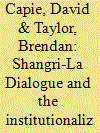| Srl | Item |
| 1 |
ID:
137620


|
|
|
|
|
| Summary/Abstract |
Using a case study of Beijing’s participation in the Shangri-La Dialogue, a prominent annual security gathering in Singapore, this article analyses China’s approach to Asian security multilateralism. It does so by developing and employing a typology consisting of four characterizations of multilateral engagement: China as “blocker”; China as “socialized participant”; China as “shaper”; and China as “opportunistic participant”. The article shows that in its approach to the Shangri-La Dialogue, China displays all four of these traits, while noting that some are more prevalent and compelling at certain points in time. It uses this finding to draw conclusions about Beijing’s future engagement with the Shangri-La Dialogue and its broader approach to security multilateralism. It also contributes to the larger debate over whether China is a “revisionist” or a “status quo” rising power.
|
|
|
|
|
|
|
|
|
|
|
|
|
|
|
|
| 2 |
ID:
097128


|
|
|
|
|
| Publication |
2010.
|
| Summary/Abstract |
The gradual institutionalization of defence diplomacy is becoming an increasingly prominent and potentially important feature of security dialogue in the Asian region. This stands in marked contrast to Asia's recent history, where across the region multilateral defence or military interactions have traditionally been regarded with suspicion. This article examines the emergence of Asia's most prominent exercise in defence diplomacy: the Shangri-La Dialogue (SLD). Within a relatively short space of time, this forum has developed into one of the most important opportunities for regional defence ministers and senior military officers to meet and exchange views on security issues. Yet despite its growing standing, the SLD has received virtually no scholarly attention. The article begins by reviewing the origins and development of the SLD, before outlining its operating modalities. It seeks to account for the apparent appeal of the SLD, measured in terms of its capacity to consistently attract high-level representation and favourable reviews. The article explores how the SLD might develop in the future and outlines some of the challenges it faces, including the rise of potentially competing mechanisms for defence diplomacy in East Asia. The article closes by outlining a number of areas for further research.
|
|
|
|
|
|
|
|
|
|
|
|
|
|
|
|
| 3 |
ID:
119222


|
|
|
|
|
| Publication |
2013.
|
| Summary/Abstract |
This article examines why Asia's multilateral defence diplomacy has been a relative laggard when compared to other forms of institutionalized security dialogue, and what explains its recent rise. It argues that explanations that stress the "catalytic role" of external shocks such as the Asian Financial Crisis (AFC) or changes in the distribution of power or threats are underdetermining. Rather, Asia's new multilateral defence diplomacy reflects strategic emulation on the part of ASEAN elites, who localized ideas initially put forward by outsiders in order to maintain ASEAN's central place in the regional security architecture. Its rise has also been helped by the changing role of militaries in some East Asian states and its rapid institutionalization owes much to historical contingency, in particular the interests of two influential ASEAN Chairs in Indonesia and Vietnam. The final part of the article briefly assesses the future prospects and influence of regional multilateral defence diplomacy.
|
|
|
|
|
|
|
|
|
|
|
|
|
|
|
|